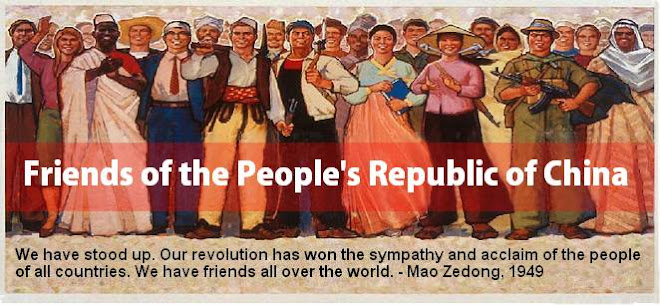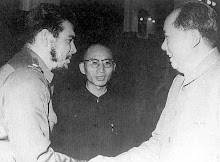Good to see the Pres Hu Jintao addressing this issue, perhaps the most important issue in the war of liberation against imperialism and empire's machinations to conquer the minds of especially our young people. The only way the Global South, including China, can win our youth to our side is by developing a more effective cultural front of struggle than the empire's.
Imperialism is using the internet and satellite channels such as Al-Jazeera as their vanguard in the attempt to colonise the minds of our youth, and they have been relatively successful doing this. We in the Global South will continue to lose this cultural battle if we do not develop effective cultural struggle to beat the empire, and go on the cultural offensive.
People should also remember, that historically Communist China has had a profound revolutionary cultural impact on the struggle of oppressed peoples in the 'west', especially the Black Liberation Movement, see HERE for more information on this.
Sukant Chandan - Sons of Malcolm/Friends of China
Chinese President Hu Jintao warns of cultural warfare from
[source]
Chinese President Hu Jintao said the Party must meet the 'growing spiritual and cultural demands of the people'
The West is using cultural warfare to divide China, Chinese President Hu Jintao warned the Communist Party on Monday.
Mr Hu called on the 80 million-plus Party members to fight "hostile international powers" and meet the "cultural demands" of the people.
"Hostile international powers are strengthening their efforts to Westernise and divide us," Mr Hu wrote in the latest edition of Communist Party's magazine, Seeking the Truth.
"We must be aware of the seriousness and complexity of the struggles and take powerful measures to prevent and deal with them," he warned in his article.
Mr Hu was writing in the revolutionary magazine used by Chairman Mao to spread his ideology after it was launched in 1958.
"The international culture of the West is strong while we are weak," Mr Hu's article said. "Ideological and cultural fields are their [western forces'] main targets," Mr Hu wrote.
He also said the Party must meet the "growing spiritual and cultural demands of the people".
The call to arms against the West's perceived collective cultural genocidal policy follows recent Government orders to propaganda officials to push harder China's expensive global "soft power" drive.
The Communist Party is splashing out 45 billion yuan (£4 billion) to expand its overseas media, including a United States and UK edition of the state-run and heavily censored China Daily, the state news agency Xinhua, and China Central Television's (CCTV) multilingual news and culture programming.
Overseas Confucius Institutes have also sprung up to try and win over a sceptical international audience impressed by Beijing's economic success but wary of its harsh authoritarian governance.
Mr Hu's article is also part of general Party rhetoric aimed at countering the growing influence of the internet and increasing commercialism in China – all of which is leading to a more confident and louder public criticism of the government.
Spooked since the start of the Arab Spring uprisings a year ago, Beijing has been further tightening internet and media control in an attempt to "improve positive publicity" and guide public opinion.
Western-style TV programmes such as talent shows – which have proved a huge hit in China – have also been targeted in the crackdown.
In November, the country's media watchdog banned advertisements during television dramas.
However, Western tastes and themes, including festivals such as Christmas and Valentines' Day, are growing in popularity among the middle classes and young, And it's not just western ideology that threatens the Party's desire for strong red culture at home and abroad.
A walk down any main street in a first or second tier Chinese city reveals how China's internet-savvy youth are fast-becoming fashion conscious and are adopting the hairstyle, clothes and musical tastes of their cutting-edge peers – in neighbouring South Korea, Taiwan and Japan.
China's President Pushes Back Against Western Culture
[source]
BEIJING - President Hu Jintao of China has said that the West is trying to dominate China by spreading its culture and ideology and that China must strengthen its cultural production to defend against the assault, according to an essay in a Communist Party policy magazine published this week.
Mr. Hu's words signaled that a major policy initiative announced last October would continue well into 2012.
The essay, which was signed by Mr. Hu and based on a speech he gave in October, drew a sharp line between the cultures of the West and China and effectively said the two sides were engaged in an escalating culture war. It was published in Seeking Truth, a magazine founded by Mao Zedong as a platform for establishing Communist Party principles.
"We must clearly see that international hostile forces are intensifying the strategic plot of westernizing and dividing China, and ideological and cultural fields are the focal areas of their long-term infiltration," Mr. Hu said, according to a translation by Reuters.
"We should deeply understand the seriousness and complexity of the ideological struggle, always sound the alarms and remain vigilant and take forceful measures to be on guard and respond," he added.
Those measures, Mr. Hu said, should be centered on developing cultural products that can draw the interest of the Chinese and meet the "growing spiritual and cultural demands of the people."
Chinese leaders have long lamented the fact that Western expressions of popular culture and art seem to overshadow those from China. The top grossing films in China have been "Avatar" and "Transformers 3," and the music of Lady Gaga is as popular here as that of any that of any Chinese pop singer. In October, at the annual plenum of the party's Central Committee, where Mr. Hu gave his speech, officials discussed the need for bolstering the "cultural security" of China.
"The overall strength of Chinese culture and its international influence is not commensurate with China's international status," Mr. Hu said in his essay, according to another translation.
"The international culture of the West is strong while we are weak," he said.
Mr. Hu did not address the widespread assertion by Chinese artists and intellectuals that state censorship is what prevents artists and their works from reaching their full potential. Last week, Han Han, a novelist and China's most popular blogger, discussed the issue in an online essay called "On Freedom."
"The restriction on cultural activities makes it impossible for China to influence literature and cinema on a global basis or for us culturati to raise our heads up proud," Han Han wrote.
The publication of Mr. Hu's essay and other articles in Seeking Truth on bolstering China's cultural power signaled that this would be a central initiative in 2012, which is a transition year for the Chinese leadership as seven of the top nine party members step down from the Standing Committee of the Politburo. Mr. Hu appeared keen to enshrine the culture drive as a final defining moment of his decade-long tenure at China's helm.
The Central Committee meeting in October established the ideological foundation for a tightening of a cultural sphere that is only now beginning to unfold. Right after the meeting, officials announced a sweeping new policy to wipe scores of so-called entertainment shows off the air. That took effect on Sunday. Television stations have been racing to come up with new programs that will be deemed "socially responsible" by the censors.
Last month, officials in Beijing and other cities ordered Internet companies to ensure that people posting on microblogs, called Sina Weibo in Chinese, had registered their accounts using their real names, though they could still post under an alias. Officials have been putting pressure on executives and editors running the microblog platforms to self-censor, and many microblog users say the microblogs have been getting less interesting.
At the same time, China has been making a push to increase its cultural influence abroad, or its "soft power." The government has opened up Confucius Institutes around the world to aid foreigners in learning Chinese. The state is also lavishing financing on opening operations of large state-run news organizations, including Xinhua, the state news agency, and China Central Television in cities around the world. Officials from those organizations say they hope their version of the world events becomes as common as those from Western news organizations.





1 comment:
You've already lost the battle. Admit it.
Post a Comment